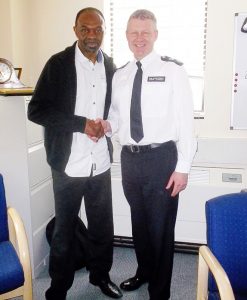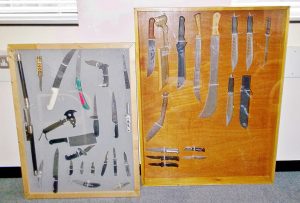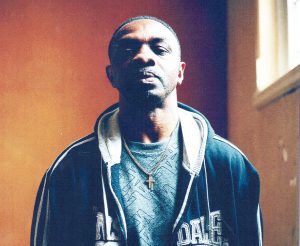
James Cook MBE with the Borough Commander of Hackney.
As I stood outside Rectory Road Overground Station at 12.45 on a Thursday afternoon in April 2016 waiting for former British & European super-middleweight champion, James Cook MBE, a grey Fiat parked up at the kerb. Two young men emerged from the car and remained on the other side of the pavement railing, holding a conversation in a language that I took to be Turkish. A black teenager came strolling down the street and, as he passed by, the trio instantaneously fused into a hostile triangle of testosterone-fuelled posturing and projectile glares. I was a mere few feet away, but I felt in no personal danger as the three of them only had eyes for each other. The menacing exchange lasted for the briefest of moments, but the intensity of the display made me feel grateful for the metal barrier that separated them.
When James arrived a few minutes later, we headed off to Stoke Newington Police Station to meet with the Borough Commander of Hackney, Detective Chief Superintendent Simon Laurence. Our mission was to discuss the Independent Advisory Group (IAG). Every London borough has an IAG, consisting of police officers, including the respective Borough Commanders, and representatives from the local community who are termed as advisers. Meetings are held on a quarterly basis, and an open line of communication is maintained at all times. The key objective is for the Met Police to gain a deeper insight into the mood on the street generally and obtain guidance on various cultural matters.
As the Borough Commander explained, “We want representation on the Hackney IAG from as many communities as possible. For example, our Chair of ten years is from the Jewish community. One of our younger members from the black community is the Chair of the Stop and Search Monitoring Group. Also, we’ve made some real inroads with the Muslim community recently. We need people who are going to challenge us, absolutely challenge me personally and the Met as an organisation. The whole purpose of the IAG is to check that we are getting things right. I would imagine that all Borough Commanders would treat their IAG exactly the same as me, but it’s personal to me and it means something to me.”
James Cook, who was awarded his MBE in 2007 for services to youth justice, is the driving force behind the Pedro Youth Club in Rushmore Road, Clapton, an area of East London which was once described by the Daily Telegraph as being “more dangerous than Soweto.” James had been an adviser to the Hackney IAG for five months at that point, and he explained “We invited some local police officers to come to one of our Pedro boxing shows and they spoke to me about it then, so I thought I’d give it a try. The meetings are really good, because we’re normal people who want to help the community. We bring things up that aren’t working, and the police are listening to us. If anything is happening in your particular area, you might get a phone call or a text from the police to let you know about it and they’ll ask if you can try and calm it down. A lot of people, especially the young people, would rather speak to somebody they know before the police come, so we’re there to sort of keep the peace.”

Knives confiscated off the streets of Hackney.
In the Borough Commander’s modestly sized office there is a prominent display of the variety of knives that his officers encounter on a daily basis. He told us that, during the seven days prior to our visit, 25 of these weapons had been apprehended. He pointed to a horrifically offensive looking blade and remarked “That’s called a Rambo knife. It’s not for filleting fish. It’s not for butchering meat. The only purpose of that knife is to cause serious harm and to kill, and there is no place in London or the UK for these knives.”
You only have to take a walkabout with James Cook in his area to appreciate the affable Jamaican’s standing with the locals. He seems to know everybody, and he regularly waves across the street and swaps greetings with passers-by. However, in the process of doing his outreach work, Cook acknowledges that he frequently puts himself at risk. “I can definitely say that even the little ones are carrying knives now. They’re trying to look up to somebody, and they’re looking up to people with big cars and lots of money. The youth clubs and places for them to go are getting less and less. At the end of the day, what do you want young people to do? Where do you want them to go? There may be five of them hanging about together on the street, and all of a sudden you’ve got a gang walking round the area. We have all these different groups of people living in Hackney, and they’re not mixing enough. At the Pedro Club, we’ve got three football teams now for the under-elevens. I take them across to Hackney Marshes and I look at the ethnic mix. It’s really beautiful, and the kids just want to enjoy themselves.”
The IAG concept was originally formed in the early-eighties in the wake of the Brixton riots, around the time when Cook was embarking upon his professional boxing career. A responsible citizen who has been doing voluntary youth work since he was a teenager himself, Cook freely admits that the mutually cordial relationship that he enjoys with the Borough Commander would have been unthinkable in those days. “It would never have happened back then, no way, which shows how far things have progressed. Simon is a good guy. He’s the Borough Commander of Hackney and, at the same time, you can talk to him properly and he means the things he says.”
James Cook’s multicultural football matches conjure up a harmonious image, but it should never be far from our collective minds that the scene which unfolded outside Rectory Road Station is the other side of the story. The contribution that individuals such as James make to our communities is synonymous with housework. One tends not to appreciate it until the job neglects to get done, a notion which the Borough Commander was keen to highlight. “The work that James does is absolutely marvellous, and you don’t get an MBE for nothing. I’m really proud to have James on my IAG. If we think about the whole gang culture, if these young people have got nowhere to go, no positive role model, there is a big chance that they’re going to fall into a life of crime. The whole idea of something like the Pedro Club is they’ve got somewhere where they can expend their energy, somewhere which is safe and where they’ve got good people who care about them.”
[Anyone wishing to contact James Cook at the Pedro Youth Club can do so at info@pedroclub.com]

Guardian of the streets of Hackney.
(Photo by Paul Osman)
I am hoping my two professional footballers in Kosovo can come and see you and provide input to the football initiatives as to guests who are 21 and 25 as Khalid Basit, (25) and Abdul Bashiru (13) as striker and forward from Ghana Dreamteam on youtube and now at FC Pristina. I met them for my 70th birthday and from there I thought how could we at Pedro Cluyb network with footballers. I am proud that the words of Youth Justice are positive as there is a chance for kids to learn to evade enticement into crime.
Well done.
Pauline Badger. Patron – 2011 to the present.